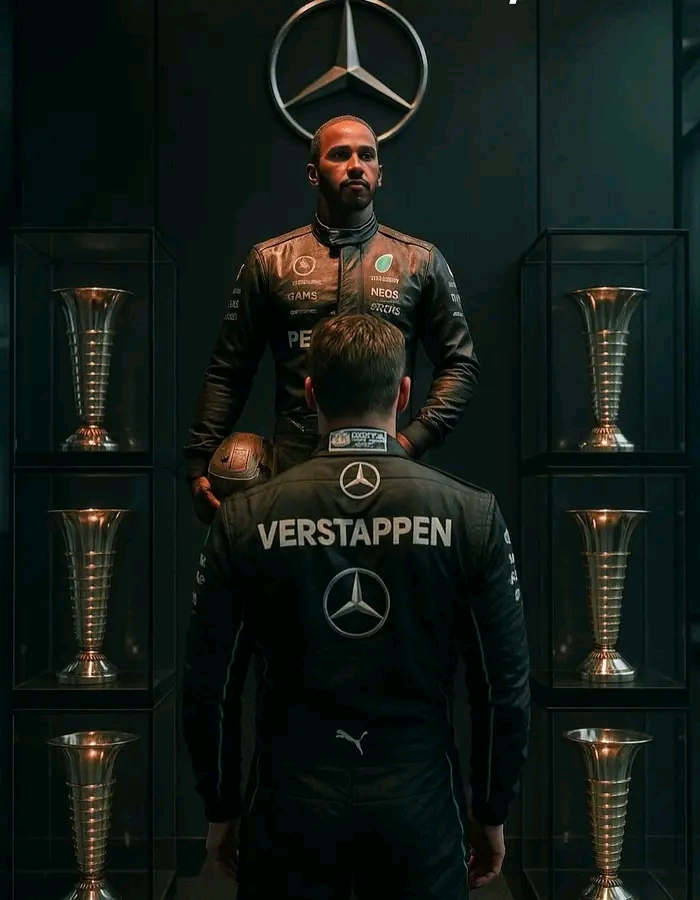Can Max Verstappen Match Lewis Hamilton’s L… read more
In a strikingly symbolic and powerful visual, a digitally-altered image has taken the motorsport world by storm — it features reigning World Champion Max Verstappen dressed in Mercedes overalls, facing a stoic and statuesque Lewis Hamilton, framed under the iconic Mercedes-Benz emblem. Hamilton, a seven-time world champion, stands elevated, trophies on both sides, symbolizing not just his physical presence but also the towering legacy he has built during his record-breaking stint at Mercedes. The image, originally shared by a page named “Desi dance,” poses a question that echoes through the F1 paddocks and fanbases alike: Can Max Verstappen match Lewis Hamilton’s legacy if he joins Mercedes?
A Shift in Formula 1’s Power Dynamics
For over a decade, Lewis Hamilton and Mercedes have been synonymous with dominance in Formula 1. Since his switch from McLaren to Mercedes in 2013, Hamilton has clinched six world titles with the team, redefining the standards of consistency, resilience, and excellence. His partnership with the German marque yielded 82 wins, over 100 pole positions, and a legacy that redefined the modern era of F1.
Meanwhile, Max Verstappen, the prodigious Dutchman, has created a legacy of his own at Red Bull Racing. After securing three consecutive world championships from 2021 to 2023, he has established himself as the benchmark for the next generation. His aggressive driving, iron-clad mental strength, and raw speed make him a formidable force. But as the motorsport landscape changes and rumors swirl about Verstappen’s long-term future at Red Bull amid internal team dynamics, the prospect of a move to Mercedes seems more plausible than ever — especially after Hamilton’s blockbuster switch to Ferrari for the 2025 season.
The Mercedes Seat: An Opportunity or a Trap?
Filling the void left by Hamilton is no easy task. Mercedes, once the undisputed kings of the turbo-hybrid era, have struggled in the ground effect regulations introduced in 2022. While Red Bull capitalized on the new era with Adrian Newey’s brilliant RB18 and RB19 designs, Mercedes found themselves grappling with porpoising issues and inconsistent performance. Even with George Russell’s talent and promise, the team hasn’t been able to replicate their past dominance.
If Verstappen were to switch to Mercedes, he would be inheriting a team in transition, not a powerhouse in its prime. The challenge would be immense — not only to win races but to rebuild the structure and morale of a team that’s learning to live without its talisman. But then again, legends are born not from comfort, but from adversity. This move could be Verstappen’s opportunity to demonstrate he can do what Hamilton did: transform a good team into a great one.
Comparing Legacies: More Than Just Numbers
Hamilton’s legacy at Mercedes is not defined solely by statistics — though those alone are historic. It’s also about his influence on team culture, his leadership under pressure, and his role in elevating the standards of professionalism in the sport. Hamilton broke barriers, becoming the first and only Black driver in Formula 1 and using his platform to advocate for diversity, sustainability, and social justice — factors that extend his legacy beyond the track.
Verstappen’s legacy is being carved out differently. He is celebrated for his racing instincts, his no-nonsense approach, and his fierce competitiveness. While Hamilton often built his victories with surgical precision, Verstappen has been more gladiatorial — a quality that has endeared him to a new generation of fans. But if he is to match Hamilton’s stature at Mercedes, he will need more than speed. He will need patience, vision, and an ability to inspire those around him.
The Risks and Rewards of a High-Stakes Move
There’s always a risk involved in switching teams, especially one as monumental as moving from Red Bull — a proven winner — to a team currently in rebuilding mode. Verstappen’s move would inevitably draw comparisons to Hamilton’s historic transition from McLaren, which at the time was questioned but ultimately proved genius. If Verstappen could replicate that impact, it would elevate his name into even greater historical relevance.
On the other hand, failure to return Mercedes to the top would also tarnish the perceived invincibility that currently surrounds him. Critics would say his success was car-dependent, tied to Red Bull’s engineering excellence rather than his individual brilliance. The pressure would be enormous — but so would the reward.
Fan Reactions and the Future of F1
The F1 community remains divided on the possibility. Some believe Verstappen should stay with Red Bull to build a Schumacher-like dynasty, while others argue that true greatness lies in conquering different mountains. The image of Verstappen in Mercedes gear has ignited debates across social media, with fans envisioning a dramatic narrative twist that could reignite Mercedes-Red Bull rivalry in a new form.
The reality remains that any such move is speculative — for now. But the idea is tantalizing. Verstappen versus Russell in the same machinery? Verstappen leading a Mercedes revival? Verstappen trying to surpass Hamilton’s records while wearing the same overalls? The ingredients are there for what could be the next great F1 saga.
Conclusion
The image may be digitally generated, but the question it poses is very real and potent: Can Max Verstappen match or even surpass Lewis Hamilton’s Mercedes legacy? It depends not just on his talent — which is unquestionable — but on his willingness to embrace a challenge bigger than himself. To write history, one must be willing to step into its shadows — and then create light of their own.
Whether Verstappen joins Mercedes or not, this debate captures the essence of what makes Formula 1 great: the relentless pursuit of greatness, the battles of generations, and the ever-shifting tides of dominance. One thing is certain — the next chapters of F1 will be nothing short of thrilling.




